|
|
|
Sort Order |
|
|
|
Items / Page
|
|
|
|
|
|
|
| Srl | Item |
| 1 |
ID:
190362
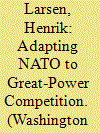

|
|
|
|
|
| Summary/Abstract |
Following Russia’s February 2022 invasion of Ukraine, NATO’s main challenge is to eliminate doubts about its strength and resolve to defend every inch of its territory, as stated in its recently published Strategic Concept, an authoritative document for the alliance’s strategic direction until 2030 (and beyond).Footnote1 By the Vilnius Summit in the summer of 2023, the alliance is set to complete the transition to a new NATO Force Model to deter Russian aggression. However, NATO’s adaptation to the military threat posed by Russia is complicated by the simultaneous need to factor in the rise of China. A rising China is stretching US military resources, and its technological clout creates vulnerabilities for a functioning defense alliance. These are vulnerabilities to which European NATO members must be especially attuned.
|
|
|
|
|
|
|
|
|
|
|
|
|
|
|
|
| 2 |
ID:
170881
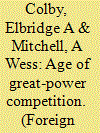

|
|
|
| 3 |
ID:
192141
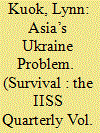

|
|
|
|
|
| Summary/Abstract |
Many Asian governments regard Russia’s war with Ukraine as a distant event with limited impact on the region, beyond rising food and energy prices and possibly increasing the risk of China attacking Taiwan. But the war has strained the rule of law and is entrenching ideological divisions, introducing unnecessary complexity into alliances and partnerships. Asian governments should be alert to the negative implications of these developments for regional peace and security. For them to condemn Russia’s invasion of Ukraine and defend the rule of law would not be to blindly support the West, and would be entirely consistent with their national interests. The West, for its part, should avoid worsening geopolitical fault lines. To this end, the United States might refrain from characterising great-power competition as a battle between autocracies and democracies, and from painting China and Russia with the same broad ideological brush.
|
|
|
|
|
|
|
|
|
|
|
|
|
|
|
|
| 4 |
ID:
181686
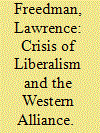

|
|
|
|
|
| Summary/Abstract |
Liberalism as the ideology of the Western alliance is in crisis. Having seen off Nazism and communism, it gained influence after the end of the Cold War, which produced optimism about security, human rights and global prosperity. Now liberalism, shaken by the financial crisis and the wars in Afghanistan and Iraq, is in retreat. Illiberal states, notably China and Russia, are reshaping the international system. Liberalism may not be able to continue to bind allies together, or enable them to cooperate effectively in a severe crisis. There are three counters to a gloomy prognosis, however. Firstly, heightened great-power competition has reinforced rather than undermined the alliance. Secondly, Russia and China have no substantial alliances, and are showing that authoritarian governments face serious problems of their own, including entrenched leaderships. Thirdly, liberalism remains better equipped to adapt to new circumstances.
|
|
|
|
|
|
|
|
|
|
|
|
|
|
|
|
| 5 |
ID:
189033
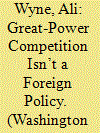

|
|
|
|
|
| Summary/Abstract |
The past year has witnessed two major developments that have trained the sights of US policymakers more sharply on America’s chief strategic competitors. First, the conclusion of a protracted US intervention in Afghanistan would seem to offer Russia and China an opening to make strategic inroads across Central Asia. Second, Russia’s brutal invasion of Ukraine has raised the specter of a military confrontation between nuclear-armed powers and revealed China to be, while not actively supporting Russian atrocities, then at least concerningly unmoved by them.
|
|
|
|
|
|
|
|
|
|
|
|
|
|
|
|
| 6 |
ID:
183255
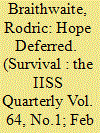

|
|
|
|
|
| Summary/Abstract |
The Soviet Union was formally replaced by the Russian Federation on 25 December 1991. Americans felt they had won the Cold War. Russians felt an angry sense of humiliation. The Soviet potential for collapse had become visible after Josef Stalin died in 1953. It was not corrected by the Soviet leadership nor picked up by Western governments, and it was masked by Soviet military and international success. But eventually the Soviet leadership could no longer ignore the growing crisis. They appointed Mikhail Gorbachev to find a remedy. He failed. His eventual successor, Vladimir Putin, used force to restore Russia’s role abroad, but ran an increasingly brutal and corrupt regime at home. Russians had hoped that Russia might become prosperous and stable, on good terms with its neighbours. Though that hope was much diminished by Christmas 2021, a flicker nevertheless remained.
|
|
|
|
|
|
|
|
|
|
|
|
|
|
|
|
| 7 |
ID:
183406
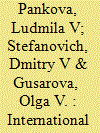

|
|
|
|
|
| Summary/Abstract |
In the coming decade, intensifying competition between great powers will
have a significant impact on the development of space activities (SA) and
on the future of international cooperation in this field. The article examines
the scope, development paths and competitive advantages of individual
countries in the field of space activities, and explores fundamental issues
of competition and cooperation. A system analysis method is used to
assess current dynamics in this area. The U.S. is expanding cooperation
with its allies, while Russia is strengthening cooperation with China in the
SA field. We note the “securitization” of SA development processes and
emphasize the expansion of the “space” dimension of the international
security agenda. There is a danger that “natural competition” may turn
into “confrontation,” which is a key factor influencing, inter alia, the need
to change the form of organization, the principles, the strategy, and the
mechanisms of international cooperation. The article also substantiates the
need to strengthen the role of international cooperation in the SA field as
a “binding” component of global security.
|
|
|
|
|
|
|
|
|
|
|
|
|
|
|
|
| 8 |
ID:
188453
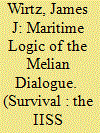

|
|
|
|
|
| Summary/Abstract |
There is a maritime logic embedded in Thucydides’ ‘Melian Dialogue’ that until now has attracted little notice; observers have instead concentrated on the deeper philosophical and moral issues highlighted by Thucydides in his tale drawn from the Peloponnesian War. Nevertheless, the maritime logic that propelled a confrontation on the island nation of Melos nearly 2,500 years ago could re-emerge in the run-up to a conflict in the Western Pacific. Allies are the strategic enabler of the US naval presence in the region, and US forces are taking steps to develop concepts and doctrine to enable operations in and along the First Island Chain. Denying access to these logistical facilities might be a political priority for China in the run-up to potential military action, and it would not be surprising if Beijing delivered a simple message to the inhabitants of the First Island Chain: stay out of it, and we will leave you out of it. All of this suggests that the idea of ‘neutrality’, as encountered in the Melian Dialogue, might again emerge during a crisis. Because the incentives to restrict US access to forward-operating bases are so clear-cut, strategists need to anticipate the emergence of ideas related to limiting the ability of US naval units to use port and air facilities in the Western Pacific.
|
|
|
|
|
|
|
|
|
|
|
|
|
|
|
|
| 9 |
ID:
188166
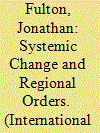

|
|
|
|
|
| Summary/Abstract |
The Persian Gulf regional security complex is shaped by intense competition between regional states and, since the aftermath of Operation Desert Storm, US military preponderance. US security cooperation with the Gulf Cooperation Council member states has sustained a status quo that has allowed extra-regional countries to advance their interests without making significant contributions to regional stability. An examination of the presence of five Asian countries (China, India, Japan, Singapore and South Korea) in the Gulf suggests that, as the US signals intentions to reduce its security commitments to the region, the perception of hegemonic retreat will influence the regional policies adopted by these Asian countries. A further and related consideration is the ‘great-power competition’ narrative that is driving politics at the systemic level. The US-China bilateral relationship will have a significant impact on extra-regional powers’ approach to the Gulf.
|
|
|
|
|
|
|
|
|
|
|
|
|
|
|
|
| 10 |
ID:
188455
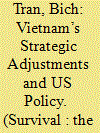

|
|
|
|
|
| Summary/Abstract |
Vietnam has become an important space for Sino-US strategic competition. Hanoi is reluctant to choose a side, however. The main objectives of its foreign policy have been to avoid conflict, develop the domestic economy and defend the homeland. To advance these goals, Vietnam has maintained a strategy of independence, autonomy, openness and multilateralisation, diminishing the role of communist ideology, shifting from a continental to a maritime orientation, and enhancing its international status. A thorough understanding of these developments could enable the United States and other democratic countries to build closer ties with Vietnam and other Southeast Asian countries.
|
|
|
|
|
|
|
|
|
|
|
|
|
|
|
|
| 11 |
ID:
188458
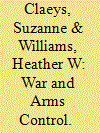

|
|
|
|
|
| Summary/Abstract |
Russian President Vladimir Putin has repeated nuclear threats in connection with the war in Ukraine since Russia invaded on 24 February 2022, and senior Russian military leaders have reportedly considered when and how Moscow might use a tactical nuclear weapon in Ukraine. On 27 October, in this context of rising nuclear risks, the US Department of Defense released its Nuclear Posture Review. It describes the present moment as a time to prepare rather than negotiate. Although now is not the time to begin negotiations towards a formal arms-control treaty, the end of the war in Ukraine will be an important opportunity for pursuing post-crisis arms-control efforts. Meanwhile, during this arms-control interlude, the United States and its allies should lay the groundwork for future arms-control efforts.
|
|
|
|
|
|
|
|
|
|
|
|
|
|
|
|
| 12 |
ID:
186366
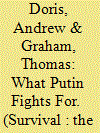

|
|
|
|
|
| Summary/Abstract |
Russia’s invasion of Ukraine has reignited debate over the role of NATO expansion in producing the current crisis. Robert Person and Michael McFaul dismiss Russian President Vladimir Putin’s NATO concerns as a ‘fiction’, arguing that it was actually the expansion of democracy that threatened his autocratic regime. This argument draws a false distinction between trends Russians view as deeply entwined. Democracy and NATO expansion were not separate issues for Putin and the Russian elite, but mutually reinforcing elements of a concerted Western effort to contain Russia’s ambitions as a great power. Putin’s distaste for democracy does not overshadow but rather reinforces his objections to NATO. Because NATO expansion played an important role in producing the invasion, halting that expansion might have persuaded Putin to pursue his goals through less violent means.
|
|
|
|
|
|
|
|
|
|
|
|
|
|
|
|
| 13 |
ID:
169577
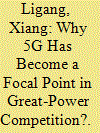

|
|
|
|
|
| Summary/Abstract |
In recent months, President Donald Trump defined the race to 5G as “a race that America must win”. A long article in The New York Times reported that the US administration defined 5G competition as a "new arms race" and believed "whichever country dominates 5G will gain an economic, intelligence and military edge for much of this century." The report quoted an analyst who claimed the transition to 5G was a revolution and "this will be almost more important than electricity."
|
|
|
|
|
|
|
|
|
|
|
|
|
|
|
|
|
|
|
|
|